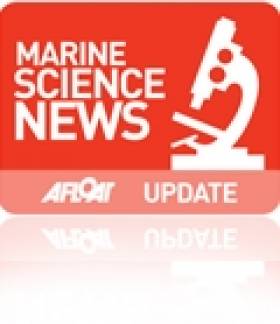Displaying items by tag: UWTV
Marine Institute Brings Underwater TV Survey Tech To Bay Of Biscay
#MarineScience - The first underwater TV (UWTV) survey of the Bay of Biscay Nephrops grounds was carried out on the RV Celtic Voyager from 20-29 September.
This survey involved collaboration between the fishing industry and IFREMER, the French equivalent of the Marine Institute. The Celtic Voyager was chartered for this survey by the French fishing industry (CNPMEM).
The team of French scientists from Lorient were trained in the UWTV survey methodology by Jennifer Doyle, an expert from the Marine Institute. A fishing industry observer also participated in the survey.
This was the furthest south that the Irish Celtic Voyager research vessel has been to at 45°55′N 2°22′W.
The Bay of Biscay Nephrops grounds, known locally as 'la Grande Vasière', have an area of approximately 11,600 sqkm and support landings of Neprophs (better known as Dublin Bay prawns or langoustines) of around 4,000 tonnes annually.
During the 10-day survey, 160 UWTV stations were successfully completed with an average depth of 100 metres. At each station a sled-mounted camera system is towed at 1 knot. This allows for the detailed examination of the sea bed. The Nephrops burrows on the video footage collected are identified and counted by trained and experienced scientists.
Weather conditions throughout were perfect for TV operations with light winds, little or no swell and sea surface temperature around 20 degrees C. The visibility at the seabed was also excellent. The results from this survey will be analysed by IFREMER scientists to determine stock abundance.
The Marine Institute have been developing UWTV survey methods and technology since 2002. Since then, survey coverage has been expanded: in 2014 the main Nephrops stocks fished in Irish waters are have all been fully surveyed – Aran Grounds, Porcupine Bank, Western Irish Sea, Eastern Irish Sea, South Coast, Smalls, Labadie, Jones and Cockburn Banks.
These UWTV surveys form the cornerstone of the ICES assessments and management advice. The results of the TV surveys directly form the basis of the catch options.
All UWTV Marine Institute surveys reports are available online in the Marine Institute's open access repository.





























































